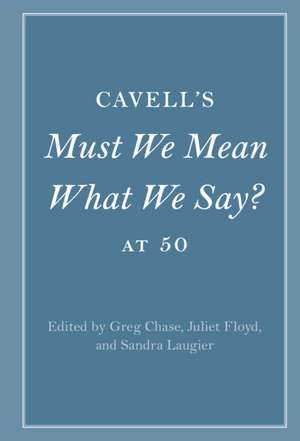Cavell's Must We Mean What We Say? at 50: Cambridge Philosophical Anniversaries
Editat de Greg Chase, Juliet Floyd, Sandra Laugieren Limba Engleză Hardback – 9 mar 2022
Preț: 646.60 lei
Preț vechi: 798.27 lei
-19% Nou
Puncte Express: 970
Preț estimativ în valută:
123.77€ • 134.48$ • 104.03£
123.77€ • 134.48$ • 104.03£
Carte tipărită la comandă
Livrare economică 21 aprilie-05 mai
Preluare comenzi: 021 569.72.76
Specificații
ISBN-13: 9781316515259
ISBN-10: 1316515257
Pagini: 262
Dimensiuni: 157 x 235 x 17 mm
Greutate: 0.52 kg
Ediția:Nouă
Editura: Cambridge University Press
Colecția Cambridge University Press
Seria Cambridge Philosophical Anniversaries
Locul publicării:Cambridge, United Kingdom
ISBN-10: 1316515257
Pagini: 262
Dimensiuni: 157 x 235 x 17 mm
Greutate: 0.52 kg
Ediția:Nouă
Editura: Cambridge University Press
Colecția Cambridge University Press
Seria Cambridge Philosophical Anniversaries
Locul publicării:Cambridge, United Kingdom
Cuprins
Introduction: Part I. Ordinary Language and its Philosophy: 1. Must we mean what we say? and ordinary language philosophy Sandra Laugier; 2. Revolutionary uses of Wittgenstein in must we mean what we say? Juliet Floyd; 3. Actions and their elaboration Jean-Philippe Narboux; 4., Faces of the ordinary Eli Friedlander; Part II. Aesthetics and the Modern: 5. Language-games and 'forms of life': Cavell's reading of Wittgenstein and its relevance to literary studies Greg Chase; 6. Philosophic and aesthetic appeal: Stanley Cavell on the irreducibility of the first person in aesthetics and in philosophy Arata Hamawaki; 7. Reading into it or hearing it out? Cavell on modernism and the art critic's hermeneutical risk Robert Engelman; 8. Must we sing what we mean?: 'Music discomposed' and philosophy composed Vincent Colapietro; Part III. Tragedy and the Self: 9. Philosophy as autobiography: From must we mean what we say? to little did I know Naoko Saito; 10. The finer weapon: Cavell, philosophy and praise Victor J. Krebs; 11. On Cavell's on Kierkegaard's on authority and revelation-with constant reference to Austen Kelly Jolley; 12.Tragic Implication Sarah Beckwith; 13. Gored states and theatrical guises Paul Standis.
Descriere
An accessible investigation of the importance of Cavell's most famous work for modern and contemporary philosophy and literature.




